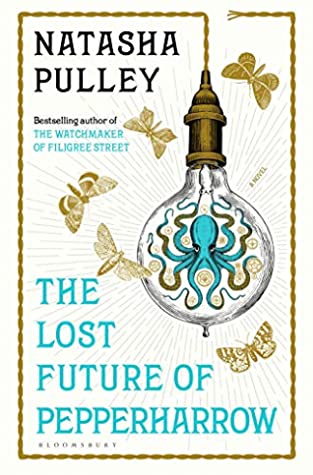
The Lost Future of Pepperharrow is Natasha Pulley’s third book, but the direct sequel to The Watchmaker of Filigree Street. The story picks up approximately four years after the events of Watchmaker.
Mori, Thaniel, and Six have settled into a quiet existence. Mori is in Russia, and has been for awhile. Thaniel bides his time taking care of Six, working at the Foreign Office, and waiting for the post (and hopefully a message from Mori); however, London’s thick toxic fog means the post is often delayed. It is one such day without the post when Thaniel is assigned to Tokyo’s British legation. Officially, he is assigned to be a translator; unofficially, he is being sent to investigate the legation staff’s claims of ghosts. This all couldn’t have come at a better time because London’s toxic fog is wreaking havoc on Thaniel’s already weak lungs.
When Thaniel returns from work that evening, Mori has returned from Russia. He also has business in nearby Yokohama, so they set off together, with Six, to Japan.
In Japan, things aren’t as they seem. There are mysterious electrical storms, disappearances, and ghostly figures. And when Mori disappears, Thaniel realizes that these events may have more in common than it appears.
I definitely enjoyed The Lost Future of Pepperharrow more than The Watchmaker of Filigree Street. I think that the plot came together much more cleanly than in Watchmaker. While Thaniel is removed from some of the storyline, you can see how it is playing out in underlying details and small breaks to follow other characters like Takiko Pepperharrow.
Grace still appears in The Lost Future of Pepperharrow, but she is not a POV character and her interaction with the main cast is quite small. Another of my complaints from Watchmaker regarding historical racism is also a lot better this time around, mostly because the story takes place in Japan so the characters are all in a different context.
In The Lost Future of Pepperharrow, Takiko is used similarly to Grace in Watchmaker. However, I liked Takiko’s characterization more. She was a more complex character, who had realistic and complicated feelings about Mori and about his clairvoyance. I also prefered the way that Takiko was used as an obstacle between Mori and Thaniel’s relationship over how the same point was handled with Grace. However, I was still disappointed in the way that her character ended up coming across as kind of disposable.
If you are anticipating, or hoping for, seeing some happy family development and interactions between Mori, Thaniel, and Six, the majority of the story is not going to give that to you. There is more development for all of their relationships, but a lot of it is based around some fantastic angst (sorry, I love relationship angst (as long as it all turns out alright)).
Mori and Thaniel have never really spoken about their relationship or what they are to each other. This brings up a lot of anxiety with Thaniel because he feels like he might be pushing something on Mori that he is indifferent about. And when he meets Takiko, those anxieties grow into feelings of being unwanted. Mori’s interactions with Thaniel during this time don’t help Thaniel’s feelings. But, Thaniel comes to an even more difficult (and heartbreaking) realization about why Mori is acting the way he is. With all of the trouble in their relationship, Thaniel and Six leave Yoruji early for his job in Tokyo.
I can’t quite put a finger on what the problem is specifically, but The Lost of Future of Pepperharrow is still missing something to make me love it. Don’t get me wrong, I enjoyed the story, and I enjoyed it significantly more than The Watchmaker of Filigree Street. But, it still isn’t a stand out novel for me. And it isn’t my favourite of Natasha Pulley’s novels. Maybe it’s the clairvoyance, the steampunk-esque aesthetic, the second marriage of convenience in the series, or something else not yet identifiable, but it’s just not the book for me.
If you are a fan of historical fantasy, and want something with an LGBT relationship, I recommend The Lost Future of Pepperharrow. It is a detailed book with a strong voice and an interesting setting.
